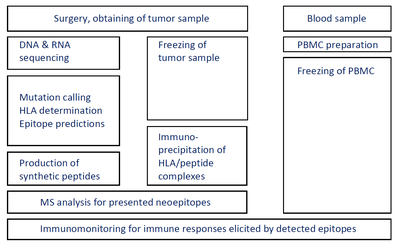Mutation-derived tumor neoepitopes
Summary of the Project
Although cancer therapy has improved substantially over the last decades, there is still a high need for more specific anti-cancer treatments. Cancer immunotherapies may be a solution to this challenge.
Checkpoint blockade agents have mediated impressive tumor regressions – however, as these agents act unspecifically on all activated T cells, severe autoimmune reactions also have been observed.
The beneficial responses triggered by these therapies have been found mostly to be directed against tumor mutation derived neoepitopes. Thus, therapies specifically targeting these epitopes, such as neoepitope-specific vaccinations or adoptive transfer of neoepitope-specific T cells, could combine the efficiency of existing immunotherapeutic approaches with tumor-specificity.
To achieve this, it is crucial to identify neoepitopes which are presented to the immune system on the surface of tumor cells, and are therefore suitable targets.
Scientific Goals
- Assess the presence (and thus targetability) of tumor-specific neoepitopes on the tumor cell surface by mass spectrometry.
- Explore the capacity of the identified neoepitopes to stimulate tumor-reactive T cells.
- Open the possibility of developing future therapies against such validated epitopes.

Intervention Scheme
Josef K, Klevenz, A, Vormehr M, Diken M, Kreiter S, Sahin U, Blatnik R, Riemer AB. Direct detection of predicted tumor neoepitopes by targeted mass spectrometry. EMBL-Cancer Core Europe Conference on Cancer Immunotherapy, Plenary Talk, February 2017.
Volkmar M, Rebmann J, Hotz-Wagenblatt A, Poschke I, Espinosa O, Offringa R. Identification of neoepitopes from PDAC xenograft exomes using a hybrid reference genome. EMBL-Cancer Core Europe Conference on Cancer Immunotherapy, Oral presentation, February 2017.
Tunger A, Wehner R, von Bonin M, Kühn D, Heidenreich F, Matko S, Nauerth M, Rücker-Braun E, Dietz S, Link CS, Eugster A, Odendahl M, Busch DH, Tonn T, Bonifacio E, Germeroth L, Schetelig J, Bachmann MP, Bornhäuser M, Schmitz M. Generation of high-avidity, WT1-reactive CD8+ cytotoxic T cell clones with anti-leukemic activity by streptamer technology. Leuk Lymphoma 2017, 58(5): 1246-9.
Koşaloğlu Z, Zörnig I, Halama N, Kaiser I, Buchhalter I, Grabe N, Eils R, Schlesner M, Califano A, Jäger D. Identification of immunotherapeutic targets by genomic profiling of rectal NET metastases. Oncoimmunology 2016, 5(11):e1213931.
Schumacher T, Bunse L, Pusch S, Sahm F, Wiestler B, Quandt J, Menn O, Osswald M, Oezen I, Ott M, Keil M, Balß J, Rauschenbach K, Grabowska AK, Vogler I, Diekmann J, Trautwein N, Eichmüller SB, Okun J, Stevanović S, Riemer AB, Sahin U, Friese MA, Beckhove P, von Deimling A, Wick W, Platten M. A vaccine targeting mutant IDH1 induces antitumor immunity. Nature 2014, 512(7514): 324-7.
Contact
PD Angelika Riemer MD, PhD
DKFZ, Junior Research Group Immunotherapy and -prevention (F130), and University Hospital Heidelberg, Institute of Immunology, DZIF Junior Research Group Molecular Vaccine Design
Phone: + 49 6221 423820
Email: a.riemer(at)dkfz.de
Prof. Marc Schmitz, MD
Institute of Immunology, Medical Faculty Carl Gustav Carus, TU Dresden and Immune Monitoring Unit, NCT Dresden, University Hospital Carl Gustav Carus, TU Dresden
Phone: + 49 351 4586501
Email: marc.schmitz(at)tu-dresden.de
Prof. Dirk Jäger, MD
NCT Heidelberg, University Hospital Heidelberg, Department of Medical Oncology and DKFZ, Applied Tumor-Immunity (D120)
Phone: + 49 6221 567229
Email: dirk.jaeger(at)nct-heidelberg.de
Daniel Stange, MD, PhD
University Hospital Carl Gustav Carus, TU Dresden, Department of Gastrointestinal, Thoracic and Vascular Surgery, Junior Research Group Gastro-intestinal Stem Cell Biology
Phone: +49 0351 45818263
Email: daniel.stange(at)uniklinikum-dresden.de
Prof. Michael Platten, MD
DKFZ, CCU Neuroimmunology & Brain Tumor Immunology (G160) and University of Heidelberg, Universitätsmedizin Mannheim, Dept. of Neurology
Phone: +49 621 3832885
Email: m.platten(at)dkfz.de
Prof. Rienk Offringa, PhD
DKFZ, Molecular Oncology of Gastrointestinal Tumors (G180), and University Hospital Heidelberg, Department of Surgery, Section Pancreas Carcinoma Research
Phone: +40 6221 423140
Email: r.offringa(at)dkfz.de


